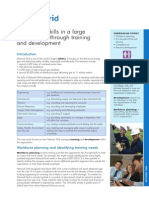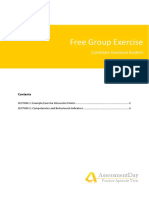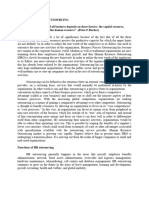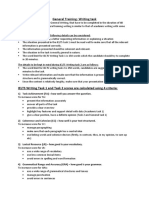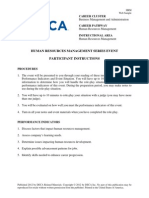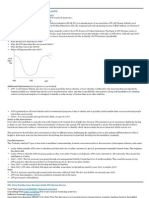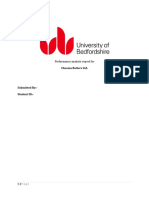Scottishpower 14 Full
Scottishpower 14 Full
Uploaded by
Saurabh SinghCopyright:
Available Formats
Scottishpower 14 Full
Scottishpower 14 Full
Uploaded by
Saurabh SinghOriginal Description:
Copyright
Available Formats
Share this document
Did you find this document useful?
Is this content inappropriate?
Copyright:
Available Formats
Scottishpower 14 Full
Scottishpower 14 Full
Uploaded by
Saurabh SinghCopyright:
Available Formats
www.thetimes100.co.
uk
Recruitment and selection in the energy industry
Introduction
Businesses need to recruit and select the best people. This helps them achieve their aims and objectives. This is particularly relevant in the fast-moving energy industry that plays such a significant role in powering the UK. ScottishPower, which is part of the wider Iberdrola Group, is a leading international energy company. It focuses on three key areas: growth, safety and service. There are three main business units: Energy Networks/UK - providing a secure and growing network to supply energy across the UK Energy Retail/UK - one of the UKs top suppliers of gas and electricity selling to 5.2 million UK customers Energy Wholesale/UK - trading large quantities of energy and supplying energy in bulk to the UK market. ScottishPowers sister company, ScottishPower Renewables, is also part of the Iberdrola Group. It provides renewable energy and is the leading provider of green energy products in the UK. These have low carbon emissions and use renewable sources of energy, such as wind power. ScottishPower and ScottishPower Renewables are at the forefront of innovation and are involved in major engineering challenges. These range from wind farms and hydro-electric power to tidal turbines, gas power stations and new technology to produce clean energy, such as the groundbreaking carbon capture development. ScottishPower and ScottishPower Renewables offer a diverse range of career opportunities. Careers with ScottishPower Energy Networks e.g. Project Manager, Civil Engineer, Apprentices, Tradespeople Energy Wholesale e.g. Mechanical Egineer, Financial Controller, Tradespeople Energy Retail e.g. Call Centre Agent or Team Managers Corporate Team (Head Office) e.g. Human Resources Manager
CURRICULUM TOPICS Human resource management Recruitment Selection Skills and competencies
GLOSSARY Hydroelectric power: electricity generated through the power of the gravitational force of falling water. Tidal turbines: used to harness the power of tides and turn it into a useful form of energy, e.g. electricity. Carbon capture: technology that filters out carbon emissions from power station gases before release into the environment. Employability: a person has enough skills and abilities so that a company wants to employ them. Human resource management: the management and development of an organisation and its people.
ScottishPower understands that employability is at the heart of an economically prosperous and vibrant society. The company actively engages with its communities by delivering a number of educational and vocational programmes. These programmes are aimed at improving the employability of young people and providing potential workforce talent. This approach means that ScottishPower is viewed as an employer of choice.
The role of Human Resource Management
People are one of the most important resources used by any organisation. ScottishPower recognises that it is powered by people. Human Resource Management (HRM) is concerned with organising and looking after people in the workplace. On a day-to-day basis this includes recruitment, selection, training and development and assessing staff performance. An important part of HRM is workforce planning. This involves getting the right people in the right place at the right time. It also involves identifying the numbers of people required to enable the business to operate at full efficiency. These people need to have the right skills to do the job. Part of workforce planning therefore involves planning development opportunities. Development increases the skills of the current workforce. The energy industry is changing quickly which means it is important to recruit and train people with the capability to carry out new jobs. This is particularly essential in the growing renewable energy sector.
129
Recruitment is required to www.thetimes100.co.uk replace those who are retiring
GLOSSARY Recruitment: the process of identifying the need for a new employee, defining the job, attracting candidates and selecting those best suited for the job. Selection: the process of choosing which person to appoint from those that apply for a job vacancy. Entry levels: different points in a companys structure at which people may join. Apprenticeship: individuals taken on by a business, which agrees to train them for a particular trade or role, to gain a recognised qualification within that industry. Skills: specific abilities, attributes and techniques. Assessment centre: the place where the final evaluation and testing of candidates takes place, which may be run by the recruiting company or an external body on its behalf. Competencies: areas of activity in which a firm or individual is particularly strong, e.g. research and development, product innovation. Psychometric testing: a set of short questions which when analysed give an outline of a particular candidates personality.
help the company to expand into new markets
provide new skills to enable the company to expand into new areas such as wind and wave power
ScottishPower aims to provide a positive recruitment and selection experience for every employee and prospective employee. ScottishPower is committed to equal opportunities for everyone regardless of factors such as race, sex, age or disability.
Recruitment
Recruitment into ScottishPower takes place at a number of entry levels. Two of the most important of these are at the apprentice level and at that of graduate trainee. Since the 1990s recruitment activity for large companies often takes place online. In addition, specific jobs may be advertised in the local or national press. The ScottishPower website provides a wealth of detail about the company and careers. It makes it possible for applicants to download details and application forms for Modern Apprenticeships and Graduate Programmes. In both cases, applicants must meet minimum requirements of qualifications or experience. Literature about careers with ScottishPower is available through the Careers Service in schools and universities. Apprenticeships Apprenticeships allow new employees to earn a good wage while working and learning new skills. They lead to nationally recognised qualifications. The qualification is specifically related to job relevant skills. Apprenticeships are at two levels: Apprenticeships Level 2 are equivalent to five good GCSE passes or Standard grades; Advanced Apprenticeships Level 3 are equivalent to two A-level passes or Higher grades. The Apprenticeship programme at ScottishPower lasts three to four years and blends training with work based learning and assessment. To apply for an Apprenticeship programme an applicant must complete an online application form. ScottishPower then invites applicants to attend an assessment centre. Here candidates undertake practical and written tests. They are then interviewed to check that they have the competencies required to fill the job. This is followed by a medical to check their fitness levels. Graduate programmes ScottishPowers Graduate programmes are for candidates with a university degree. The graduate programme lasts two years and is tailored to each graduates individual aspirations and business requirements. Candidates need to be able to demonstrate in their application form their motivation (why they want the job) and competency (their ability to carry out the job). Those candidates who meet ScottishPowers requirements are invited to a one-day session at an assessment centre. Selecting suitable candidates currently involves: a group exercise an individual presentation psychometric testing a competency-based interview.
Skills and competencies
ScottishPower states that at the heart of all business visions and activities it is the people whose individual efforts and performance make it happen. Its people need to have the necessary skills and competencies in order to carry out their roles effectively. ScottishPower has developed a competency framework. This sets out what behaviours employees need to have to perform job-related tasks. There are three main areas of competency which reflect the key skills ScottishPower employees must have: Planning for the Future includes Strategy, Change Orientation, Innovation and Creativity Delivering for the Customer includes Customer Focus, Delivering Results, Analysis and Decision Making Working with Others includes Communication, Leadership, Building Relationships.
130
The competency framework enables ScottishPower to set out the abilities that are required to do certain jobs. For example, in relation to Working with Others the competency framework is set out as follows: Competency area Communication Summary Interacts with others, understands and conveys information clearly, able to communicate effectively in individual and group situations. Creates and shares vision, empowering individuals and teams to develop their full potential. Creates and shares vision, empowering individuals and teams to develop their full potential. Uses personal motivation to generate enthusiasm, engagement and achievement. www.thetimes100.co.uk
GLOSSARY Performance reviews: regular meetings that take place between a job holder and their line manager to discuss how well the job holder is performing in relation to expected targets. Job description: A document setting out the key responsibilities and tasks involved in performing a particular job. Person specification: Details of the personal qualities an individual will need to perform a particular job. Selection: the process of choosing which person to appoint from those that apply for a job vacancy.
Leadership
Building Relationships Able to establish, build and maintain effective relationships. Interacts with others, understanding and conveying ideas clearly and convincingly. This framework can also be used as part of ongoing performance reviews to measure how well a person is performing in a particular job. The competencies are set at three levels according to the level of responsibility an individual has. This is illustrated by taking the example of the different levels an employee will achieve for Customer Focus. Level 1 Customer Focus Responds to customer requests Level 2 Improves service to customers Level 3 Anticipates future customer needs
When recruiting new employees ScottishPower sets out its skills requirements in two key documents.
on Job descripti
cription of the job des Key elements include: d its main e of the job an the purpos s and tasks responsibilitie b reports to who the jo e and salary scal its location s ie nc te pe d com the skills an b. jo e y out th needed to carr
Person specif ication
The person sp ecification de scribes: the personal qualities an in di vidual will need to pe rform the job in question what qualifi cations, experie nce, skills and abilities ar e essential to carry out the key object ives of the job and which are desir able a candidate must have the essential elements; bein g able to dem onstrate the desirable factors gives hi m or her an advant age during se lection.
Together the person specification and the job description should contain enough information to attract appropriate people. Candidates are able to match their own skills and qualifications to what is specified. These documents also act as a checking device for the business, enabling recruiters to make sure that applicants with the right skills are chosen for interview.
Selection
The selection process involves identifying talented individuals. The company particularly requires individuals with a business or engineering background.
131
The typical steps in the selection process are:
Vacancies advertised on website or other media www.thetimes100.co.uk Screening of applicants to find the best match with person specification
GLOSSARY Aims: the general end purposes towards which an organisation focuses its activities. Objectives: the end purposes that an organisation or individual seeks to achieve. Competitive advantage: a strategic element that enables an organisation to compete more effectively than its rivals.
Successful candidates invited for interview
Unsuccessful candidates
Successful candidates asked to complete job related tests
Unsuccessful candidates
Successful candidate(s) sent offer letter and contract
The process of selection gives candidates different ways of presenting themselves to best advantage. A clear and compelling application form showing what a candidate has achieved is the first element. At interview, he or she then has the opportunity of expanding and explaining their suitability for the role. In assessment and role play exercises, applicants can demonstrate key competencies such as team working, planning capabilities and leadership potential. This is important as ScottishPower looks for those people who will have the capacity to develop both themselves and the business. Selection for ScottishPower also involves identifying people with particular personal qualities including a passion for achieving the highest standards. These include, for example, having the ability to communicate and influence others. Having these skills and capabilities within the business will help it meet its aims and objectives. It should also give it a competitive advantage. In return, the new recruit benefits from comprehensive training and will have the opportunity for personal development. For example, he or she may be able to undertake further study and work towards relevant professional qualifications.
The Times Newspaper Limited and MBA Publishing Ltd 2009. Whilst every effort has been made to ensure accuracy of information, neither the publisher nor the client can be held responsible for errors of omission or commission.
Conclusion
ScottishPower employees may join the company at a number of levels including Apprentice and Graduate Trainee. Determining how many people and what skills the business needs is a key element of workforce planning. Getting the right people to apply so that ScottishPower can select the best applicants requires a structured approach to recruitment and selection. Detailed job descriptions and person specifications help ScottishPower to attract the appropriate skills and abilities. The selection process is supported by a range of appropriate tests to check the fit between a candidate and the competencies required by the business.
Questions
1. Define the terms recruitment and selection. 2. What are the main differences between Apprentice and Graduate level entry at ScottishPower? What methods can ScottishPower use to recruit new employees at these levels? 3. What is meant by workforce planning? How does this help an organisation like ScottishPower?
www.scottishpower.co.uk
4. How are job descriptions and person specifications used as recruitment tools at ScottishPower?
132
You might also like
- Dissertation Report Flipkart (Marketing Stategies)Document49 pagesDissertation Report Flipkart (Marketing Stategies)Paras Gupta55% (29)
- LSZH ZurichDocument85 pagesLSZH ZurichBurakETCNo ratings yet
- Resume Workshop PowerpointDocument24 pagesResume Workshop PowerpointPoddar training placement Jaipur100% (2)
- Unit 8 - Human ResourcesDocument74 pagesUnit 8 - Human ResourcesJoyNo ratings yet
- cm7842 - Harrods-Answers Part 1Document4 pagescm7842 - Harrods-Answers Part 1JoanaNo ratings yet
- Scottish Power 14 SummaryDocument2 pagesScottish Power 14 SummaryMireille L'abeilleNo ratings yet
- KrogerDocument15 pagesKrogerIjaz SultanNo ratings yet
- Recruitment and SelectionDocument20 pagesRecruitment and SelectionMay Claire M. GalangcoNo ratings yet
- Student Resource - Case StudiesDocument32 pagesStudent Resource - Case StudiesUmar AbbasiNo ratings yet
- Handbook Customer Satisfaction Loyalty Measurement 3 Ch2Document8 pagesHandbook Customer Satisfaction Loyalty Measurement 3 Ch2meromikhaNo ratings yet
- National Grid - Developing Skills in A Large Organisation Through Training and DevelopmentDocument4 pagesNational Grid - Developing Skills in A Large Organisation Through Training and DevelopmentTheodora GherdanNo ratings yet
- Job Seeker Visa GuideDocument7 pagesJob Seeker Visa GuideMirza Asad Ali100% (1)
- T3000Document12 pagesT3000Prashant Ramesh BurhadeNo ratings yet
- Nestle Edition 19 FullDocument4 pagesNestle Edition 19 Fulldesserie garanNo ratings yet
- Aldi T&D Case - OpensourceDocument4 pagesAldi T&D Case - OpensourceMruga PandyaNo ratings yet
- Free Group Exercise: AssessmentdayDocument15 pagesFree Group Exercise: AssessmentdayThuyDuongNo ratings yet
- Practice in Tray Exercise InstructionsDocument11 pagesPractice in Tray Exercise InstructionsThuyDuongNo ratings yet
- Effective Business Writing SkillsDocument2 pagesEffective Business Writing SkillsresfreakNo ratings yet
- In Out BasketDocument3 pagesIn Out Basketaswini4uNo ratings yet
- Tesco Recruitment WorksheetDocument4 pagesTesco Recruitment WorksheetZain Ali MalikNo ratings yet
- In-Basket / Prioritizing TestDocument3 pagesIn-Basket / Prioritizing TestMAYANK100% (1)
- Seismic Guide CustomerService TrainingManual FinalDocument19 pagesSeismic Guide CustomerService TrainingManual FinalCollinsNo ratings yet
- NEW Situational Judgement Test GuideDocument5 pagesNEW Situational Judgement Test GuideKim Ánh100% (1)
- Retail Buyer CV TemplateIEDocument3 pagesRetail Buyer CV TemplateIEMonster UKNo ratings yet
- Kroger Display GuidelinesDocument29 pagesKroger Display GuidelinesRajesh KumarNo ratings yet
- Elevator Pitch Tips1 - v2Document19 pagesElevator Pitch Tips1 - v2blezythecatNo ratings yet
- Deloitte Uk Hints and Tips HRDocument6 pagesDeloitte Uk Hints and Tips HRJames CheungNo ratings yet
- Senior Accountant Interview QuestionsDocument6 pagesSenior Accountant Interview QuestionsFLORENCE DE CASTRONo ratings yet
- Tesco CRMDocument15 pagesTesco CRMSnow YingNo ratings yet
- HR OutsourcingDocument3 pagesHR Outsourcingmba department100% (1)
- Exercises 1Document8 pagesExercises 1eniNo ratings yet
- E-Commerce Unit - 2Document23 pagesE-Commerce Unit - 2ArchitNo ratings yet
- Universal Competency Framework White PaperDocument9 pagesUniversal Competency Framework White PaperAna Maria SîrbuNo ratings yet
- IELTS General Writing CriteriaDocument1 pageIELTS General Writing CriteriaSawan SalhotraNo ratings yet
- Competency Based QuestionnaireDocument4 pagesCompetency Based Questionnaireclaudette rogersNo ratings yet
- Journal To Get A Sense of How Companies Deal With The Kinds of Issues Likely ToDocument5 pagesJournal To Get A Sense of How Companies Deal With The Kinds of Issues Likely ToAnika SinghNo ratings yet
- Retail Book Chap10Document23 pagesRetail Book Chap10Harman Gill100% (2)
- Human Resources - Ijhrmr - Recruiting, Retaining, and Rewarding - Phebe PriyadarsiniDocument6 pagesHuman Resources - Ijhrmr - Recruiting, Retaining, and Rewarding - Phebe PriyadarsiniTJPRC PublicationsNo ratings yet
- Interview Pack: Guidelines On Preparing For Your Interview, Including Sample QuestionsDocument18 pagesInterview Pack: Guidelines On Preparing For Your Interview, Including Sample QuestionsPol Mag UidhirNo ratings yet
- Integrity Managment and Cultural Due DiligenceDocument46 pagesIntegrity Managment and Cultural Due Diligencestars_70000No ratings yet
- Busineess Case Study of Enterprise CompanyDocument24 pagesBusineess Case Study of Enterprise CompanyRajiv MakwanaNo ratings yet
- DECA RolePlayDocument6 pagesDECA RolePlayAftab MohammedNo ratings yet
- PWC Application Form 2011Document3 pagesPWC Application Form 2011Ngoc NhuNo ratings yet
- AsdaDocument5 pagesAsdaAdnan Mirza100% (1)
- Accenture Interview 1Document4 pagesAccenture Interview 1Kisa MarkisaNo ratings yet
- Tell Me About Yourself?: Strong Points That The Employer May Concern AboutDocument37 pagesTell Me About Yourself?: Strong Points That The Employer May Concern Aboutlpl2287No ratings yet
- CaseDocument3 pagesCasePrashant Pandit100% (1)
- Recruitment Consultant Interview Questions and Answers 1827Document15 pagesRecruitment Consultant Interview Questions and Answers 1827AISHWARYA CHAUHANNo ratings yet
- Business Communication ReportDocument4 pagesBusiness Communication ReportZara HussainNo ratings yet
- TaxOverviewBrochure 2021 KPMGDocument16 pagesTaxOverviewBrochure 2021 KPMGPrathibha KarthikeyanNo ratings yet
- Objectives of HRMDocument1 pageObjectives of HRMKaushik IyerNo ratings yet
- Finance and Economics - 22 CasesDocument35 pagesFinance and Economics - 22 CasesSeong-uk KimNo ratings yet
- VP Enterprise Software Sales in Washington DC Resume Mark MilfordDocument2 pagesVP Enterprise Software Sales in Washington DC Resume Mark MilfordMarkMilfordNo ratings yet
- How To Provide: Excellent Customer ServiceDocument27 pagesHow To Provide: Excellent Customer Serviceunreal2No ratings yet
- HR in Retail: Anirban Chakraborty Arpan Banerjee Indranil Das Indira Sar Mansur Husain Prithwish Roy Sayan SarkarDocument21 pagesHR in Retail: Anirban Chakraborty Arpan Banerjee Indranil Das Indira Sar Mansur Husain Prithwish Roy Sayan Sarkarbroadband@123No ratings yet
- Employer Guide: Recommendations If Applying To A KPMG ProgrammeDocument13 pagesEmployer Guide: Recommendations If Applying To A KPMG ProgrammeSaqib JavaidNo ratings yet
- Recruitment and Selection at TescoDocument3 pagesRecruitment and Selection at TescoVishwas JNo ratings yet
- BCG Online Test Technical Instructions - 2024Document1 pageBCG Online Test Technical Instructions - 2024hantao199903300113No ratings yet
- Surejob - In-How To Make A Perfect Resume A Guide For Creating ResumeDocument13 pagesSurejob - In-How To Make A Perfect Resume A Guide For Creating ResumeP SssNo ratings yet
- Case StudiesDocument10 pagesCase StudiesShakya KuruppuachchiNo ratings yet
- Recruitment and Selection in The Energy IndustryDocument8 pagesRecruitment and Selection in The Energy IndustryImran Khan SharNo ratings yet
- Scottishpower 15 Full PDFDocument4 pagesScottishpower 15 Full PDFbtec1005mNo ratings yet
- API 610 PumpsDocument8 pagesAPI 610 PumpsSaurabh Singh67% (3)
- WTPDocument51 pagesWTPSaurabh Singh50% (2)
- Technology in ChinaDocument22 pagesTechnology in ChinaSaurabh SinghNo ratings yet
- ComputerLab AssignmentDocument1 pageComputerLab AssignmentSaurabh SinghNo ratings yet
- 'Ttft?"F-Aryt-4: .R'Document15 pages'Ttft?"F-Aryt-4: .R'Saurabh SinghNo ratings yet
- RecruitmentDocument25 pagesRecruitmentBhasker SinghNo ratings yet
- Cheema Boilers LTD.: Performance Analysis Report ForDocument6 pagesCheema Boilers LTD.: Performance Analysis Report ForSaurabh SinghNo ratings yet
- Technology Planning: Department of Management Studies, IIT DelhiDocument35 pagesTechnology Planning: Department of Management Studies, IIT DelhiSaurabh SinghNo ratings yet
- Lecture-1 (02.08.10)Document22 pagesLecture-1 (02.08.10)Saurabh SinghNo ratings yet
- Invitation-MS Proving GroundDocument2 pagesInvitation-MS Proving GroundPradiptaAdiPamungkas100% (1)
- Installation Guide PDFDocument18 pagesInstallation Guide PDFminimeNo ratings yet
- MSDS Alter SB CleanerDocument7 pagesMSDS Alter SB CleanerYogiNo ratings yet
- Handout 5-Concept of IncomeDocument7 pagesHandout 5-Concept of IncomeApolinar Alvarez Jr.No ratings yet
- S-AAA-FIF PRY (Rev 0-2015)Document31 pagesS-AAA-FIF PRY (Rev 0-2015)AAK AlAinNo ratings yet
- Safe Use of Lifting Equipment: Approved Code of Practice and GuidanceDocument68 pagesSafe Use of Lifting Equipment: Approved Code of Practice and GuidanceAndrew Liddell100% (2)
- 8 Ways To Boost A Chain AgilityDocument8 pages8 Ways To Boost A Chain AgilityDaniel RodriguezNo ratings yet
- FRM2023 Study GuideDocument30 pagesFRM2023 Study GuideAkhilesh kumar verma67% (3)
- Easa Ad 2009-0278 1Document3 pagesEasa Ad 2009-0278 1PiyushNo ratings yet
- Thesis Final VersionDocument97 pagesThesis Final VersionHammad SattiNo ratings yet
- Bench Fitting ToolsDocument7 pagesBench Fitting ToolsSaad AneesNo ratings yet
- GOOGLE CLASSROOM ReflectionsDocument2 pagesGOOGLE CLASSROOM ReflectionsAtetNo ratings yet
- Age and GenderDocument14 pagesAge and Genderslv creationsNo ratings yet
- Safety DayDocument27 pagesSafety Dayvinil radhakrishnaNo ratings yet
- DTA AgreementDocument5 pagesDTA AgreementrohitNo ratings yet
- Interview To Banamex Representative About The Economic CrisisDocument2 pagesInterview To Banamex Representative About The Economic Crisiszatara27No ratings yet
- IIS Lecture 2Document27 pagesIIS Lecture 2Saad Mohamed SaadNo ratings yet
- III. GUARANTY AND SURETYSHIP (Articles 2047-2084) : - Ong v. PCIB, G.R. No.160466, January 17, 2005 - PIADocument29 pagesIII. GUARANTY AND SURETYSHIP (Articles 2047-2084) : - Ong v. PCIB, G.R. No.160466, January 17, 2005 - PIAYodh Jamin OngNo ratings yet
- 134 A - Flexible Hose SafetyDocument1 page134 A - Flexible Hose SafetyNibha100% (1)
- Separately Excited DC Motor Speed ControlDocument6 pagesSeparately Excited DC Motor Speed Controlaamir ahmedNo ratings yet
- Subaru AWD SystemsDocument6 pagesSubaru AWD Systemsmetallgod100% (2)
- IPOfficeR7 0matrixDocument318 pagesIPOfficeR7 0matrixGustavo AlvaNo ratings yet
- Manual Serie en Bilingue Rev 01 LDocument81 pagesManual Serie en Bilingue Rev 01 Ljxp8pp6drjNo ratings yet
- Soal Uts Xii EnglishDocument7 pagesSoal Uts Xii EnglishDewi RiyaniNo ratings yet
- Object-Oriented Programming in AI: Guest Editors'Document2 pagesObject-Oriented Programming in AI: Guest Editors'Hernan Rivera CabezaNo ratings yet
- Mailbox Alarm: Small CircuitscollectionDocument1 pageMailbox Alarm: Small CircuitscollectionPeeters GuyNo ratings yet










